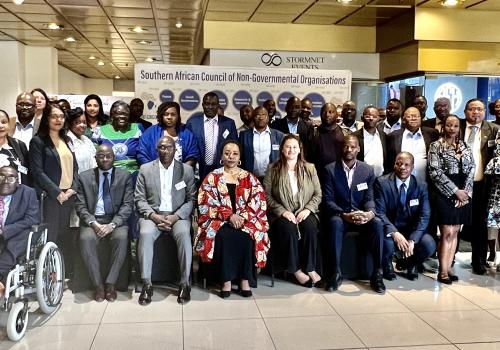The Southern African Development Community (SADC), in collaboration with the Regional None State Actors (NSA) Technical Working Group, organised a Capacity-Building Workshop for Non-State Actors (NSAs) to engage in discussions regarding the implementation of the SADC Mechanism for Engaging with Non-State Actors. This hybrid workshop was supported by European Union (EU) and took place from 11th to 12th August 2024 in Harare, Republic of Zimbabwe.
The SADC Mechanism for Engaging with Non-State Actors aims to facilitate collaboration and strengthen partnerships between the SADC region and NSAs. It focuses on enhancing coordination, harmonisation of ideas, and building the capacity of NSAs.
This workshop was convened following the approval of the SADC Mechanism for Engagement with NSAs in August 2022 by the SADC Council of Ministers. Subsequently, in March 2024, the SADC Accreditation Guidelines for Engagement with NSAs were also approved. The workshop brought together a diverse group of stakeholders to explore and enhance the effective engagement modalities under the newly approved mechanism and accreditation requirements.
During her address, Ms. Angele Makombo N’Tumba, the SADC Deputy Executive Secretary for Regional Integration, underscored the vital role that Non-State Actors play in the implementation of the SADC Regional Integration agenda. She highlighted the provisions of the SADC Treaty, which advocate for the involvement of the people of the region and various stakeholders in the process of regional integration.
Ms. Makombo N’Tumba commended the workshop as a significant step in the right direction, emphasising that despite recognising NSAs as important partners, there was previously no formal link between the SADC structures and NSAs. She further emphasised the numerous avenues through which the region has engaged with NSAs in areas such as policy formulation, implementation, monitoring and evaluation, as well as the review of regional strategies and legal frameworks.
She emphasised that, although the participation of NSAs has increased over the years, there is still a need for an overarching mechanism to foster better cohesion and coordination in citizens' participation in regional integration processes.
In his remarks, Mr. Simao Tila, the President of the Southern Africa Council of Non-Governmental Organisations (SAf-CNGO), highlighted the importance for Non-Governmental Organisations (NGOs) to strengthen their commitment to unity and collaboration in the region. He stressed the role played by SAf-CNGO, which serves as an umbrella body for civil society organisations. SAf-CNGO strives to establish a conducive platform for meaningful dialogue, strategic coordination, and collaborative problem-solving.
Mr. Tila also reaffirmed the role of NGOs in coordinating civil society efforts to address critical challenges, such as health disparities, quality education, climate change, governance issues, poverty, inequality, and the shrinking civic space.
He remarked, "Today's engagement emphasises the need for renewed commitment to unity and collaboration as we explore effective strategies towards realising 'The SADC We Want'."
Ms. Lourdes Chamorro, the Head of the Political, Press, and Information Section at the European Union Delegation in Zimbabwe, stated that the meeting was a significant milestone for non-state actors to reflect and explore ways to enhance the implementation of the NSA Engagement Mechanism. She encouraged participants to devise strategies for improving collaboration with governments in the SADC region to advance the regional integration and governance agenda.
"I am privileged to deliver remarks at the opening of this important event, which aims to strengthen the engagement between SADC and non-state actors and civil society organisations," she affirmed.
Ms. Chamorro applauded the longstanding cooperation between SADC and the EU, which has yielded positive results and continues to foster various joint initiatives.
"SADC and the EU recognise the value of collaboration, both externally and regionally. Sustainable and equitable socio-economic development must be sustained through closer regional integration and inter-regional partnerships," she further emphasised.
She noted the objective of the forum, which receives support from the EU partnership with SADC under the new Extended Integrated Capacity Building (EICB) programme. This programme, amounting to EUR 2.5 Million, aims to facilitate ongoing dialogue between SADC, Non-State Actors, and Civil Society organisations.
The workshop served as a platform for reflecting on progress and establishing the foundation for future cooperation as the region embarks on the pilot implementation phase of the SADC Accreditation Guidelines for Engagement with NSAs.
The workshop represents a significant milestone in advancing the SADC regional integration agenda, while also providing an opportunity for civil societies to engage in meaningful discussions.
The Guidelines for the Accreditation of Non-State Actors, approved by Council in March 2024, outline the accreditation criteria, application process, and governance and management arrangements for NSAs.
Among the key activities of the workshop were peer-learning and information sharing sessions from across the African continent, discussions on the Draft Framework on Operational Modalities (Constitution) of the NSAs Forum, thematic clusters, and the introduction of an online NSA Registration and Accreditation Portal, including demonstration/testing of functionality and user experience to identify further areas for improvement.

